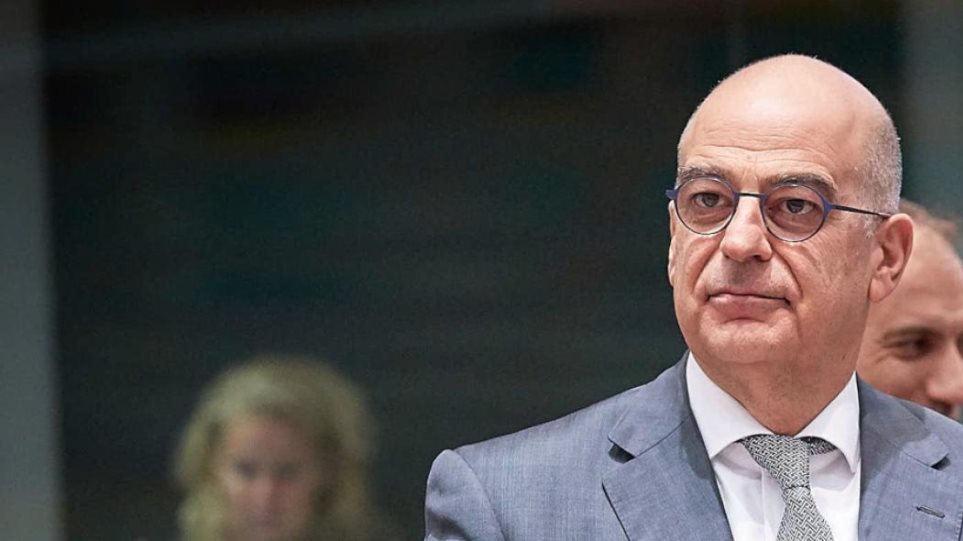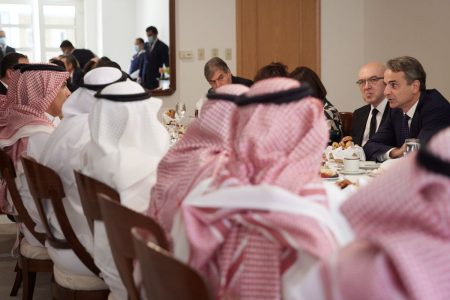Even as Turkey is escalating its aggressive acts in the Eastern Mediterranean, Cyprus’ EEZ, Libya, and the Aegean, Foreign Minister Nikos Dendias declared after a meeting today of the National Council on Foreign Policy that there is a consensus between the government and opposition parties on the management of crucial national issues and in particular Greek-Turkish tensions and the protection of Greece’s sovereignty.
Solidarity the strongest defence
“In spite of individual assessments there was consensus on the fundamental observations, as well as solidarity and responsibility among the political forces. This is the most important resource in the country’s diplomatic arsenal,” Dendias declared.
The foreign minister briefed opposition parties on “Turkey’s provocative actions and on its historically and legally groundless claims.”
“I explained that Greece remains committed to maintaining open channels of communication [with Ankara].”
Shuttle diplomacy to neutralise Turkey-Libya accord
Dendias briefed the representatives of opposition parties on Greece’s diplomatic moves to marshal an opposition front against the Ankara-Tripoli EEZ accord that expropriates and cuts through large chunks of Greece’s maritime Exclusive Economic Zone.
He has visited Rome which has a longstanding relationship and colonial history in Libya for talks with his Italian counterpart Luigi Di Maio with whom he concurred on the illegality of the Tripoli-Turkey deal.
Dendias says he expects Italy to sign on to the EastMed gas pipeline project which has brought together Greece, Cyprus, and Israel (and the US with the passing of theEastMed Act). The gas pipeline if constructed would scuttle Ankara’s expropriation of Greece’s EEZ as it would pass through the very area that Turkey and Tripoli have illegally claimed.
The EastMed Act stresses the importance of the trilateral cooperation.
“The United States, Israel, Greece, and Cyprus oppose any action in the Eastern Mediterranean and the Aegean Sea that could challenge stability, violate international law, or undermine good neighborly relations, and in a joint declaration on March 21, 2019, agreed to ‘defend against external malign influences in the Eastern Mediterranean and the broader Middle East,” the Act states clearly alluding to Turkey.
“With regard to Libya, I briefed the Council on a number of meetings with third countries and the formation of a front of shared understanding against the blatant violation of international law that the Turkey-Tripoli agreements constitute. [Libyan Marshal Khalifa] Haftar’s visit to our country proves that Greece has a role in the developments in the region.”
Dendias on 8 January visited Cairo, which is vehemently opposed to Turkey’s military intervention in Libya and has a positive stance on the Greece-Cyprus-Israel strategic partnership.
Dendias touts diplomatic blitz
The foreign minister dismissed opposition criticism that the government has not been pro-active enough in dealing with Turkey.
SYRIZA has also claimed that the government is too pliant in its relations with Washington and said that Parliament should have postponed ratifying a major bilateral US-Greece defence accord which SYRIZA itself negotiated until the US offered assurance of aid in the event of a Greek-Turkish class – either accidental or triggered by Ankara.
The government dismissed the proposal as outlandish.
“I believe that Greek diplomacy has held more bilateral and multilateral meetings than ever before. If there is something else that the government and the Ministry have overlooked, we are prepared to accept the advice of our interlocutors [opposition parties]. There are no party lines on national issues. But I didn’t see anything like that expressed,” Dendias said.
German veers toward Ankara
Regarding Libya, the Greek government and opposition parties were all angered by Berlin’s decision to exclude from a major international meeting on Libya (held in Berlin) EU member-state Greece, the sovereign rights of which have been violated by Ankara and the Tripoli government even as Turkey, which has flagrantly violated the arms embargo on Libya, was invited.
The main opposition party charged that there was complacency on the part of the government, which in turn charged that SYRIZA ignored the so-called “Berlin Process” on Libya from the start.
“With regard to the German side, the Greek government has let the Germans know – and this will very likely be accepted – that Greece should participate in the continuation of this initiative, which I must say, however, is being passed on to the UN. So far, the Berlin process has not succeeded even on the level of a ceasefire. It is being taken over by the United Nations, under Mr. Salamé. We have always been there. We talk with the United Nations. We will see what happens,” Dendias said.



